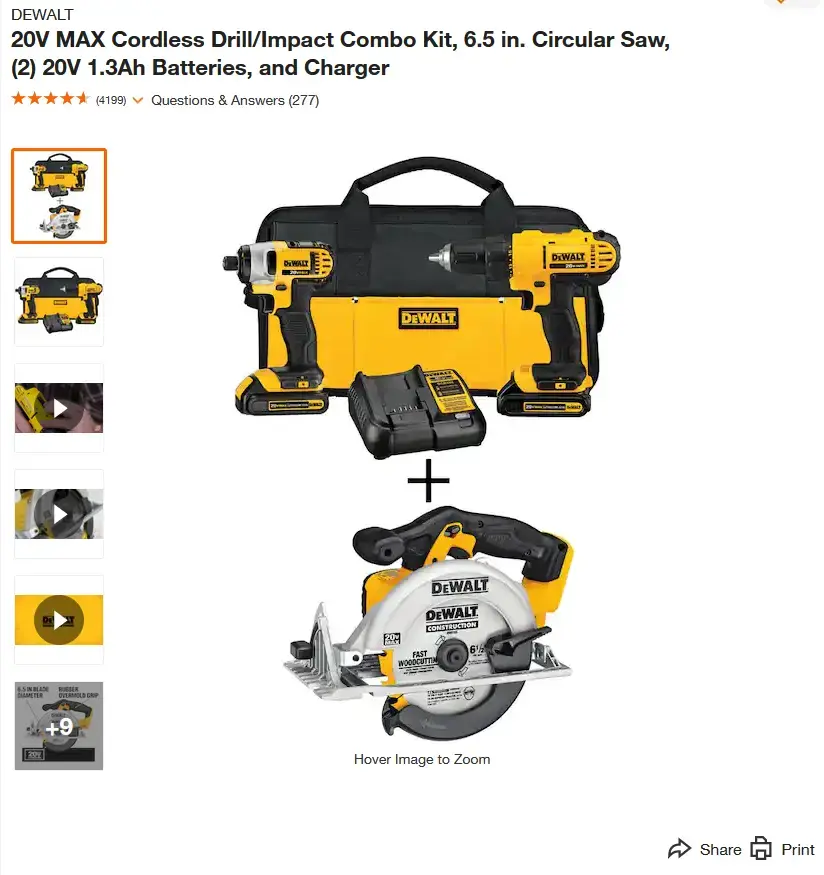See title. I have only very little tools so far, screwdriver with plenty of bits, hammer, drill. I’ve been thinking of buying more tools for general purpose home improvement. I like to work with wood, unsure what I will expand into later. Is a multitool a good fit for me?
If yes any recommendations what I want to look out for when buying one? If no any alternate recommendations?
- SMFX ( @smfx@lemmy.ml ) 14•2 years ago
Multitools do a multitude of things ‘ok’ - typically they will not be as good as a specialised tool, but in a pinch, if they are all you have to hand they will do just fine. If you are working at home, or in a workshop, I would suggest investing in the tools you need to do the jobs in hand and add to that tool kit as you need to.

I would suggest investing in the tools you need to do the jobs in hand and add to that tool kit as you need to
The problem with that advice is OP will regularly get half way through a job and then find he hasn’t got the tool he needs - so the job will be half finished while waiting until he can acquire the tool, which will often take days.
I have a very small rented flat and an extremely tight budget. So maybe having something that does things ‘ok’ is appropriate for the situation? 🤔🤔
- SMFX ( @smfx@lemmy.ml ) 5•2 years ago
Ultimately, you know more about your situation than anyone else on here. Multitools can be a boon if you do not have access to any other tools, but they invariably are not as good as specialised tools - they are very much the jack-of-all-trades, master-of-none in the tool world… I would still, if you are on a very strict budget, suggest you get some decent pliers, a decent set of screwdrivers, a hammer etc, rather than sink ~£100 into a good and usable multitool (if you buy a cheap, Chinese one, it may not last/hold up if you use it robustly).

A small cheap tool set is going to save you money over a decent multi-tool and be much easier to use. One for the home, one for your transportation, and finally a multi-tool for when you’re caught with your pants down. Just make sure you know why you’re buying the tools you’re buying.

I wouldn’t settle for anything less than a Leatherman Signal or SuperTool if you intend to get any real use out of it.
In case you want to accumulate a toolbox, the rule of thumb is to buy the cheapest tools you can find that work. When one breaks, you know you use it enough to buy a quality one.

There are a few situations in which a multitool comes in super handy, and in most of those situations it’s nearly the only thing that’ll save you time and/or effort. But as a general tool, your better off getting other things first.
My advice for your situation would be a jigsaw. My “power tool journey” from standard home improvement into beginner woodworker so far has been:
- Electric Drill
- Hammer drill (houses around here are concrete mostly)
- Jigsaw
- Handheld Circular Saw
- Multitool
- Random Orbital Sander
- Mitre Saw
- Job-site size table saw
- Trim Router

I literally used a multi tool to cut off a stuck kitchen sink faucet nut last night so I’m a little biased at the moment. Used a cheaper Ryobi brand multi tool to get it done.
If you’re in the US, Home Depot constantly has the Ryobi brand on sale. They may not be the “best” tool but they are significantly more affordable and get the job done. I’ve had my set for about two years and it had “orbital sander, circular saw, multi tool, drill, reciprocating saw, and like 3-4 batteries. “
Thanks! Not in the US but I have been wondering which modules are good. And affordability is certainly a very big factor.

I’ve noticed that, at least in the US, that the blades are MUCH cheaper online. Like my local store sells 1 blade for $20, but I can buy 20-30 blades for the same price online.

It depends on what you want to do and whether you think you’ll stick with DIY or not, but I note you say you like to work with wood. In that case you may want to consider saving a bit and investing in a drill/driver combo and a compact circular saw.
With those tools, a solid work surface, a framing square, some clamps, and maybe a jig or two once you get ambitious (don’t worry, you’ll figure it out), you’d be surprised how much you can build. Lots of us have made the mistake of climbing every rung of the tool ladder and regretting spending a lot of money that we could have avoided just by getting the right tools to start with.
I know you said you are outside of the US, but here is one example from a good brand (at least here, my team Red colleagues will have their own opinions). As you go down in quality the prices get progressively cheaper.

Again, I know it is hard advice when you are not sure how active you’ll be at the end of the day, but when it comes to high-use power tools, it is normally a good idea not to go cheap. But before anybody jumps on me – if you are only going to end up with the odd job here or there and you need to save money, this may be bad advice!
EDIT: someone else mentions a jigsaw. That isn’t a bad idea at all depending on what you’ll be doing.

You don’t need one to do most projects but they can be very useful. I’ve used mine twice today, once for cutting out a hole for a plug socket in a plasterboard wall and again to cut a skirting board attached to the wall so I could remove one section without taking off the whole board. Could I have done this with other tools, yes totally, but it makes jobs like these so easy and quick. I’ll probably use mine in most projects I do around the house, so would recommend, but I went for years without having one and it was never an issue, you just use other tools. I chose to get a battery impact driver and drill before my multi tool and never regretted that decision. Tldr, nice to have but not a necessity.

By multi-tool, do you mean a rotary tool like a dremel or one of the oscillating multi tool? Personally I haven’t found much use for a use for a rotary tool in my home improvement adventures, but I have friends more into woodworking that love the oscillating multi tools.
In addition to the ones you listed, I would recommend a jig saw, circular saw, and optionally a belt sander. That will cover most small to medium home improvement projects. I found all 3 of those tools for less than $20 each looking around pawn shops. The jig saw is the most versatile, you can cut wood or metal with the right blade, it just doesn’t excel at making straight cuts. That’s where the circular saw comes in.

Is there a specific DIY project in your near future you think you would use it for? If not, I wouldn’t recommend getting one and just have it sitting there. It would just be money best spent anywhere else.
Also, by drill do you mean an impact driver, drill, or drill with the hammer drill function? For home DIY, I find that having an impact driver, with a good set of impact ready drill bits and a variety of screw tips to be more useful than just a drill.

For home DIY, I find that having an impact driver, with a good set of impact ready drill bits and a variety of screw tips to be more useful than just a drill.
I kinda disagree. A good handheld electric drill can handle any variety of drill bits and screw bits. For most stuff, an impact driver isn’t really needed. I have this one, for example.

The same can be said for an impact driver. Another benefit being that it’s extremely easy to use. I work in the trades, and for most everyone, the drill only comes out for specialty tasks where it serves better. Otherwise the impact driver is the daily do-all tool. Usually lighter in weight, and less cumbersome as well.
Edit: forgot to add that the impact driver also takes up less real estate and can fit in places most drills can’t.
Yeah that’s what I do and haven’t had any issues. I still wonder about some of my more exotic bits. 🤣

Oh by the way, if you wanna get to know new tools, check out Adam Savage on YouTube. Anytime he talks about tools (or nearly everything actually) you learn so many new things and.
Will do. I’ve been looking for something like that thanks!
English is not my native language and I struggle with the names for tools in my native too. So I think I have a drill and a drill with the hammer function (that’s the one for concrete walls right?)
I still need to wrestle an answer out of google about what an impact driver is but ATM I am quite happy with the drill options I have.
No specific project. I come from an abusive home and wasn’t taught about or set up with a tool starter kit or anything. I would just like to learn to be more handy. Do little things around the flat. I’ve recently added two large branches to the main room that frame a photo wall. Where my glaring lack of tools in general did not help.

Hey no worries. I understand completely and had a not too dissimilar upbringing. Good on you!
This may help you understand a bit more. https://youtu.be/43cuU0lP6To

Yes, you have a regular drill (also often called a hammer drill). You absolutely need one of those.
An “impact driver” is a specialised type of drill that works better for 99% of tasks, but it can’t do 1% of them at all.
A regular drill is a motor that spins.
A hammer drill is a motor that spins while “hammering” in and out. You need that to drill into materials like concrete.
An “impact” drill is a motor that spins, but there’s a special mechanism that “hammers” in a twisting motion instead of in and out.
Imagine a really stubborn screw - so tight that your regular drill wouldn’t be able to undo it. So tight if you had a massive drill, you’d risk breaking your arm trying to turn the screw. A cheap impact driver will quickly and turn a screw like that with no fuss and without applying any force at all to your arm/body.
Even with a screw that your regular drill can undo, the impact driver will do it easier and quicker and with less force on your arm.
Also, have you ever stripped a screw head with your drill? Impact drivers never do that. They are more gentle despite being faster and more powerful.
The only drawback is you can’t really drill holes with an impact driver. They just don’t work well for that. So it would have to be your second drill, not your only one… but it’d be the one you use the most.

I just plan every project and only buy tools when I need to. Then use general tools that I have before buying something new. So mostly I am opposed to the buy ahead approach.

They are never the best tool for any job, but they make up for that by being a “good enough” tool for a thousand jobs.
I consider mine indispensable. Instead of carting a toolbox around to every task, and walking back to the shed a hundred times over I forgot some tool or other, I can simply grab two tools I know I need and a multitool for the things I might need. Usually that’s good enough.
For example, a good pair of heavy duty scissors is the best way to cut a cable tie, but the pliers or knife blade on a multi tool will get it done. You never know when you might need to cut a cable tie.
A good multitool can turn a 45 minute job into a 30 minute job. And every now and then they’ll allow you to do a job that otherwise wouldn’t be possible (good luck cutting a cable tie if you don’t have any kind of blade at all for example - nearly impossible)
Most multitools are designed for camping. Forget those, you don’t need a wine bottle opener/toothpick/fire starter/whistle… I recommend the Gerber Center Drive. It has a proper screw driver, a proper pair of spring loaded pliers that work in both directions (you can force them open, not just closed), a tungsten carbine wire cutter*, a good knife, an excellent awl for poking things, a basic lever, etc.
(* careful with the wire cutter - tungsten carbine cuts thin wires like a hot knife though butter but it will shatter like glass with thick wire. Fortunately it is a replaceable cutting blade if that happens)

